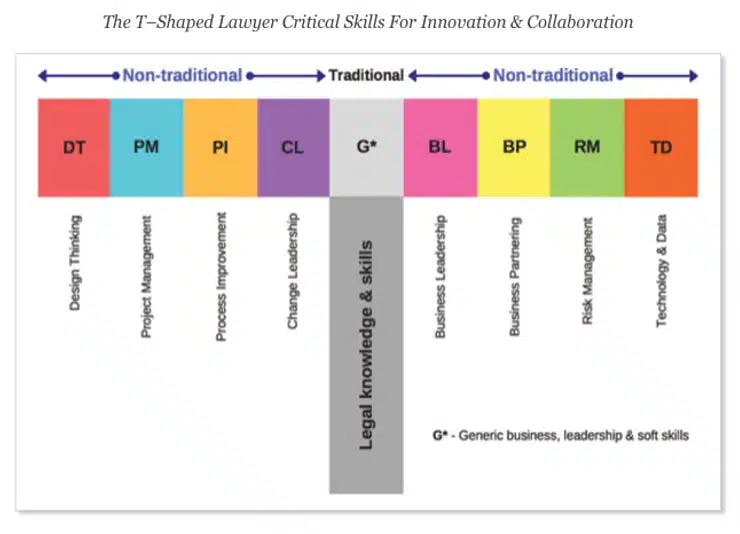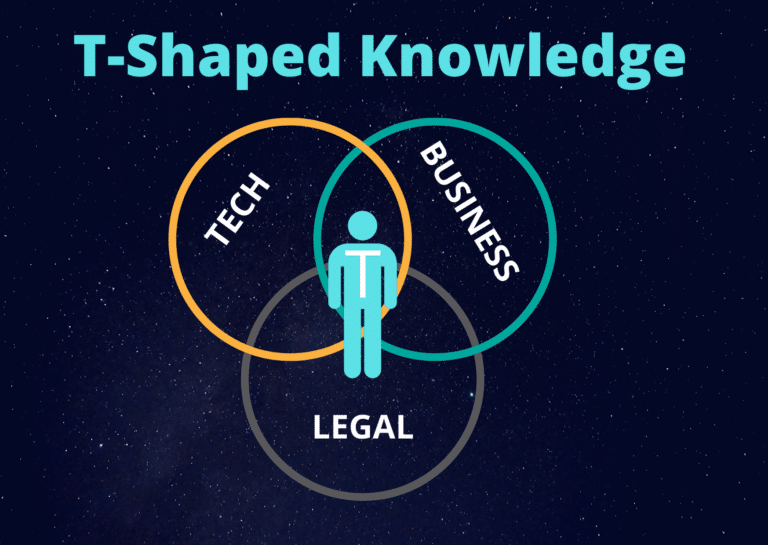Articles
How (and Why) To Become a T-Shaped Lawyer
March 12, 2024
Solution
Market Insights

As businesses expand, so too must those who work for them. As an attorney, you must also remain willing to evolve regardless of the type of law you practice. A buzzworthy label that’s getting a lot of attention these days around legal circles is the T-shaped lawyer.
At its core, a person who falls into this category has plenty of complementary skills that boost their capabilities and marketability. Dive in and learn more about what this type of lawyer looks like, why you might want to consider becoming one and how you can do it.
Key Takeaways
- A T-shaped lawyer has a strong specialty (the vertical part of the T) and an array of complementary skills (the horizontal bar) that allow for more flexibility in offering services to clients.
- Recently, businesses and clients have been looking for attorneys to perform more than one function.
- Finding your skill set may come easily, or it may take some work. Remember, it’s never too late to develop yourself.
What Is a T-Shaped Lawyer?
During law school, you spent time in classes gaining exposure to a variety of legal specializations. You likely decided the type of law you wanted to practice before your first internship, which put you on the path to your current legal career. The knowledge you have and the skills you’ve gained through practice in your specialty make up your professional foundation.
A T-shaped attorney got the name because it begins with the specialty in mind. Your professional foundation is the vertical part of a T. You cannot evolve and become a dynamic legal practitioner without this fundamental base.
The horizontal part of the T is where you can set yourself apart from others and up for further success in this ever-changing landscape of business and law. What sets you apart from your peers is the broader sweep of abilities or experiences that you can tap into and bring to the table. An attorney with a solid legal specialty and a range of related skills is a T-shaped lawyer.

Image Source: https://www.legalbusinessworld.com/post/2017/12/22/the-t-shaped-lawyer
What Is a Nontraditional Legal Skill?
So what skills beyond those honed in law school and through practice make up a T-shaped attorney? There is no shortage of nontraditional expertise you already possess or may want to delve deeper into that can make you a more dynamic lawyer. Some of these cross-skills include a better understanding and application of things such as:
- Psychology
- Technology, especially in the legal space
- Data management systems
- Negotiation skills
- Project management
Not everything is about tangible skills. Some of what makes a great T-shaped lawyer is their emotional and empathetic capabilities. For some, these are inherent, but others have to work at expanding this part of themselves so they can adapt to environmental situations and deepen interactions with others.

Image Source: https://ceelegaltech.com/t-shaped-lawyer-who-what-how-part-2-2-004-2/
Why Is the Demand for T-Shaped Lawyers on the Rise?
The world has changed drastically in the last few years with the rise in telecommuting and greater utilization of technology to automate systems and bridge the gap between people.
Law firms and companies are pivoting to meet some of these changes head-on, using things such as online video conferences, online legal management tools and data management to work smarter. Organizing file systems between offices scattered across the state or country has played a pivotal part in online collaboration between businesses and their legal counsel.
Attorneys have had to evolve quickly in response to these changing business metrics. Lawyers who can tap into their broader skills tend to be more flexible and better able to fulfill more than one role for a client.
A T-shaped lawyer is highly adaptable to changing landscapes and situations. These attorneys tend to devise and utilize innovative solutions to problems for their clients, and in doing so, they have broken the mold of what a traditional lawyer might do.
Where Do You Start?
By now, you likely know whether you want to market yourself more in the T-shape lawyer space or not, and if you do, you may not know how to start. Take a look at some of the things you may want to do to start the shift into a more dynamic legal practitioner.
Assess Your Current Skill Set
You have amassed a wealth of insight and information over your lifetime. Compile a list of your strongest attributes and skills that go beyond your legal specialty.
For instance, if you excel at getting people to see eye to eye, even in high-pressure situations, you can add “expert negotiator” to the list. Or perhaps you devised a high-level legal database that helps you and others in your practice to remain organized and advance your level of service beyond the norm.
Choose Something To Explore Further
If you don’t believe you have strong enough proficiency to advertise yourself as a T-shaped lawyer, there is always the opportunity to develop more.
Consider things you enjoy doing and conduct exploratory searches into continuing education or other opportunities to build that skill set. An important feature of these horizontal T-lawyer skills is that you successfully apply them to your practice now.
Embrace Ideas and Make Changes
Becoming more of a T-shaped attorney requires the desire to lean into new ideas and processes and become active in using them. However, taking on too much may not benefit you or your professional evolution should other aspects of your career or personal life suffer. Take these changes one at a time.
Remember, the goal is to become a more well-rounded attorney, and it doesn’t happen overnight.
Finding someone who is already doing what you want will benefit you in charting this new course. A mentor can provide insight into what works and what doesn’t. A support network of others who are also advancing their complementary skills can provide great opportunities for cross-training.
Become a T-Shaped Lawyer
If you aren’t sure yet where to start, the team at Morae can help. Just last month, we presented a webinar that set out the framework for becoming a T-shaped lawyer and the associated benefits of doing so. We can also assist in providing services that can help you automate your practice processes and afford you more time to hone your correlative skills.
Contact us to find out more about what we can do to make your practice stronger!

Stay in tune with change
Want the latest news and insights from our industry? We’ll keep you updated on all the trends and issues in risk, legal and compliance – just hit the button to receive our newsletter.